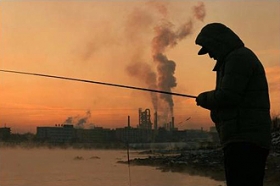China closes factory after cadmium pollution protest
BEIJING (Reuters) - China closed a chemical plant after local residents in central Hunan Province protested against cadmium pollution, which killed two people and affected hundreds of others, media reported on Monday.
The closure follows a number of recent high profile "mass incidents" which turned violent and prompted media criticism of officials' failure to respond quickly.

Two villagers near the Xianghe Chemical Factory, which had produced zinc
sulfate for six years, died in May and June. Autopsies found high levels of
cadmium in their bodies, the semi-official China News Agency said.
Tests conducted after their deaths found that over 500 out of nearly 3,000
local residents also had elevated levels of cadmium in their urine, it
added. Around 30 people were admitted to hospital after checkups, Hong Kong
media reported.
About 1,000 villagers near the plant, located near Liuyang city of Hunan
province, protested last week seeking closure of the plant.
Following their protest, the plant was closed "forever," the directors
detained and the head of the municipal Environment Protection Bureau sacked,
the China News Agency said.
Six villagers were arrested during the protest, including one who was badly
beaten by police, Hong Kong's pro-Beijing Ta Kung Pao newspaper reported.
Hunan province has tended to be tougher on plants that pollute the Xiang
River, on which the provincial capital, Changsha, depends for its drinking
water. The provincial people's congress requires annual reports on water
quality, in another sign of the local representatives' concern.
An environmental official admitted to heavy pollution of non-ferrous metals
in the Xiang river, the financial magazine Caijing reported.
The illegal extraction of non-ferrous metals in the region has increased in
recent years due to corruption, and hundreds of extraction plants are now
discharging untreated chemical-laced sewage into the river, Caijing added.
Vegetables grown along the river have also been found to contain high levels
of cadmium, mercury and lead.
(Reporting by Yu Le and James Pomfret; Editing by Lucy Hornby and Jeremy
Laurence)
© Thomson Reuters 2009 All rights reserved
